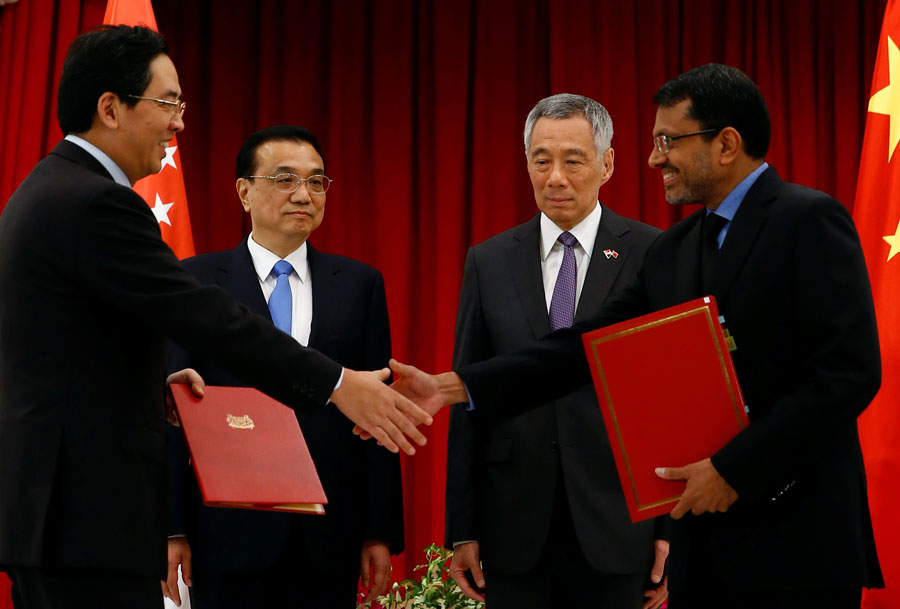China, Singapore agree to upgrade free trade pact

Premier Li Keqiang and Singaporean Prime Minister Lee Hsien Loong witness the signing of a memorandum of understanding in Singapore on Monday. (China Daily)
Two countries sign protocol to boost links in ecology, finance
China and Singapore signed a protocol to upgrade their free trade agreement, with the event witnessed by Premier Li Keqiang and Singaporean Prime Minister Lee Hsien Loong on Monday.
Several other cooperative documents were also signed in Singapore to promote cooperation in fields such as customs clearance, ecology and financial technologies.
Experts said the enhanced bilateral cooperation demonstrates that the two countries are willing to safeguard multilateralism and boost free trade.
Cooperation is a must for win-win outcomes when facing rising protectionism, unilateralism and increasing uncertainties in the international context, the premier said on his arrival in Singapore on Monday afternoon.
During his meeting with the prime minister, Li called on both sides to take the opportunity arising from the upgrade to further elevate two-way trade and investment.
China supports the economic integration of East Asia and would like to work with the Association of Southeast Asian Nations to conclude as soon as possible negotiations on the Regional Comprehensive Economic Partnership, which involves 3 billion people and 30 percent of global trade, the premier said.
In response, Lee said the upgrade brings real benefits for companies and people from both countries, and it sends a strong signal for business circles in the two nations to further expand trade and investment. The Regional Comprehensive Economic Partnership has made substantial progress in its negotiations this year and is hopefully fully agreed to as soon as possible in order to help safeguard multilateralism and free trade, Lee said.
The China-Singapore free trade agreement, the first such document between China and an ASEAN member, came into effect in January 2009. Starting that year, Singapore has levied no tariffs on imports from China. China, in turn, exempted 97.1 percent of Singaporean imports from tariffs beginning in January 2010. The two countries began negotiations on the upgrade in November 2015, and completed the process earlier this month.
From 2013 to 2017, China was Singapore's largest trading partner and Singapore was China's largest source of foreign investment. Bilateral trade hit $79.2 billion last year, up 12.4 percent year-on-year, according to the General Administration of Customs.
China's imports from Singapore rose 31.6 percent in 2017.
Zhang Jianping, director of the regional economic cooperation center at the Chinese Academy of International Trade and Economic Cooperation, said the upgrade will create huge potential for cooperation in the service sector between the two countries by reducing barriers for trade and investment, especially in the financial sector and high-tech industries.
Later this week in Singapore, Li will attend the 21st China-ASEAN leaders' meeting, the 21st ASEAN-China, Japan and Republic of Korea leaders' meeting, and the 13th East Asia Summit.
- China, Cambodia to move forward in building high-quality, high-level, high-standard community with shared future
- China to become PNG's most trustworthy partner in development course: Chinese FM
- Interview: China is Honduras' strategic partner for exports, technological development, says minister
- China, Honduras hold 4th round of FTA negotiations
- Traditional Fujian food, cultural event to be held in Singapore

